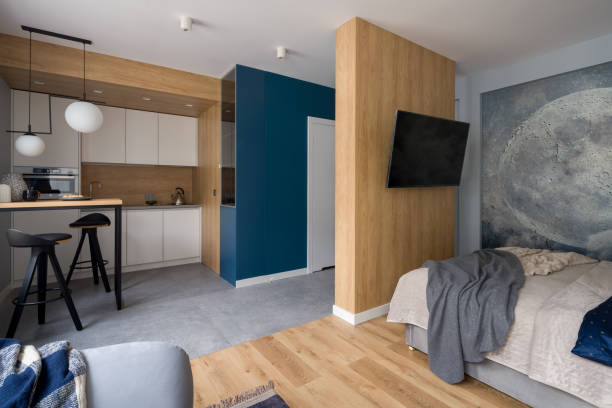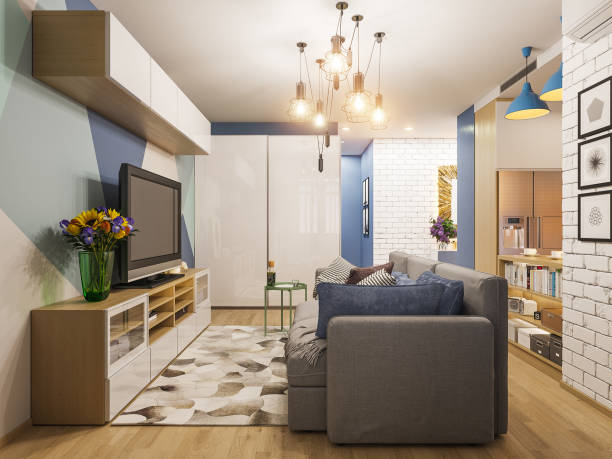Are Studio Apartments Worth It? Pros and Cons to Consider

With urbanization on the rise and housing costs soaring, many people are looking for practical living solutions that balance affordability, convenience, and comfort. One of the most common options is a studio apartment. But are studio apartments worth it? The answer largely depends on your lifestyle, financial situation, and personal preferences.
Studio apartments are compact yet functional living spaces that cater to a variety of individuals, from students to professionals and even real estate investors. While they are generally more affordable than traditional apartments, they also come with their own set of advantages and disadvantages. In this guide, we’ll explore what a studio apartment is, its pros and cons, who should consider living in one, and how to maximize space effectively.
By the end, you’ll have a clearer idea of whether a studio apartment is the right choice for you.
What Is a Studio Apartment?
A studio apartment is a self-contained living space that typically combines the bedroom, living room, and kitchen into one open area, with a separate bathroom. Unlike a one-bedroom apartment, there are no dividing walls separating the sleeping area from the rest of the space.
Studio apartments are often found in densely populated urban areas, catering to individuals who prioritize location and affordability over space. Depending on the building, some studios may come with additional features such as a small balcony, built-in storage, or lofted sleeping areas to maximize functionality.
Understanding the layout and design of a studio apartment is essential in determining whether it aligns with your lifestyle needs. If you’re someone who enjoys minimalism and efficiency, a studio apartment can be a great fit. However, if you require privacy and ample space, you may need to consider alternatives.

Pros of Living in a Studio Apartment
When deciding are studio apartments worth it, it’s essential to consider their benefits. Here are some key advantages:
Affordability
One of the biggest perks of living in a studio apartment is cost savings. Are studio apartments cheaper than one-bedroom or multi-room apartments? In most cases, yes. Rent is typically lower, and since the space is smaller, utility costs are also reduced. This makes studio apartments an excellent choice for those on a tight budget.
Lower Utility Costs
With a smaller space to heat, cool, and light up, monthly utility bills are significantly lower than in larger apartments. This is particularly beneficial for individuals looking to cut down on expenses without compromising on comfortable living conditions.
Easier to Maintain
A smaller space means less cleaning and maintenance. This is ideal for busy professionals, students, and frequent travelers who don’t have the time or energy to maintain a larger home. With fewer rooms to clean, tidying up a studio apartment takes minimal effort.
Encourages a Minimalist Lifestyle
Living in a studio apartment naturally encourages minimalism. You’ll need to be selective about what you bring into your home, which can help reduce clutter and create a more organized living environment. This lifestyle is appealing to those who prefer simplicity and efficiency.
Prime Locations
Studio apartments are often found in city centers and prime locations where larger apartments may be unaffordable. This makes them an attractive option for people who want to live close to work, entertainment, or public transportation without paying high rent for extra space they may not need.
Smart and Functional Design
Modern studio apartments often come with space-saving solutions such as fold-out beds, hidden storage compartments, and multifunctional furniture. These innovations help make the most of limited space, making studio living more practical and enjoyable.

Cons of Living in a Studio Apartment
Despite their many benefits, studio apartments also have drawbacks. It’s important to consider these factors before deciding if this living arrangement is right for you.
Limited Space
The most obvious downside is the lack of space. If you have a lot of belongings or require separate areas for different activities, a studio apartment may feel cramped. This can be especially challenging for those who work from home or have frequent guests.
Lack of Privacy
Since studio apartments have an open layout, privacy can be an issue—especially if you have visitors. Unlike a one-bedroom apartment, there are no separate rooms to retreat to, which can make hosting guests or sharing a space more challenging.
Storage Challenges
Without a dedicated bedroom or closet space, finding enough storage can be a struggle. Creative storage solutions such as under-bed compartments, wall-mounted shelves, and compact furniture are essential for keeping a studio apartment organized.
Cooking Smells
With the kitchen area located in the same space as the living and sleeping areas, cooking smells can linger. Without proper ventilation, odors from food preparation may spread throughout the apartment.
Not Ideal for Families or Couples
While some couples manage to live comfortably in studio apartments, they are generally more suited for single occupants. If you need additional space for a partner, child, or pet, a studio apartment may not be the best option.

Who Should Consider Studio Apartments?
Studio apartments are ideal for:
-
Students and Young Professionals – Those looking for an affordable, low-maintenance living space near schools or workplaces.
-
Minimalists – If you enjoy a clutter-free lifestyle, a studio apartment can help you stick to the essentials.
-
Frequent Travelers – Those who spend little time at home and don’t need a large living space.
-
City Dwellers – If you prioritize location over size, a studio in a prime area can be a great choice.
-
Investors – Studio apartments can be a smart real estate investment due to high rental demand.
Tips for Maximizing Space in a Studio Apartment
If you choose to live in a studio apartment, here are some tips to make the most of your space:
-
Use Multi-Functional Furniture – Opt for items like fold-out beds, storage ottomans, and extendable tables.
-
Maximize Vertical Space – Install shelves, wall-mounted desks, and hanging organizers.
-
Create Separate Zones – Use rugs, curtains, or room dividers to define sleeping, living, and dining areas.
-
Declutter Regularly – Keep only what you need to prevent your space from feeling overcrowded.
-
Optimize Storage – Use under-bed storage, hanging organizers, and stackable bins to make the most of your space.

Conclusion
So, are studio apartments worth it? The answer depends on your lifestyle, budget, and personal preferences. If affordability, minimalism, and city living appeal to you, a studio apartment could be a great choice. However, if you need more space, privacy, or storage, it may not be the best fit.
For those interested in real estate investing, Dwanderful offers valuable insights and resources. Founded by real estate investor and podcast host Dwan Bent-Twyford, Dwanderful provides expert guidance on building wealth through real estate. You can get a free copy of Real Estate Lingo or dive deeper with the paid book Five Pillars of Real Estate Investing.
Curious about your potential in real estate? Take the quick and fun Dwanderful Quiz to discover how you could generate six figures in the next six months—whether you’re buying your first property or your next! It takes less than a minute to complete! Contact us now!
Frequently Asked Questions:
Is it a good idea to live in a studio apartment?
Living in a studio apartment is a great idea if you value affordability, low maintenance, and urban convenience. However, it may not be ideal for those needing more space and privacy.
Why do people rent studio apartments?
People rent studio apartments because they are usually more affordable, easier to maintain, and located in prime city areas. They are especially popular among students, young professionals, and minimalists.
Is it smart to buy a studio apartment?
Buying a studio apartment can be a smart investment, especially in high-demand rental markets. They often have lower purchase prices and strong rental potential, making them attractive to real estate investors.


